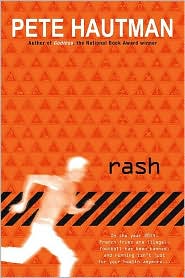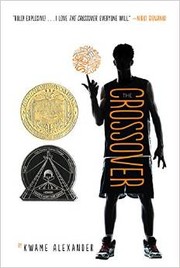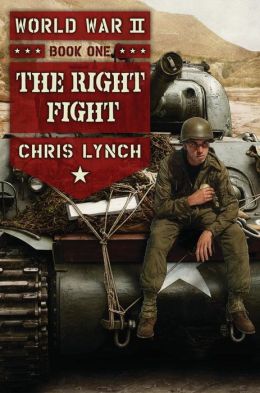new posts in all blogs
Viewing: Blog Posts Tagged with: YA Sports, Most Recent at Top [Help]
Results 1 - 10 of 10
How to use this Page
You are viewing the most recent posts tagged with the words: YA Sports in the JacketFlap blog reader. What is a tag? Think of a tag as a keyword or category label. Tags can both help you find posts on JacketFlap.com as well as provide an easy way for you to "remember" and classify posts for later recall. Try adding a tag yourself by clicking "Add a tag" below a post's header. Scroll down through the list of Recent Posts in the left column and click on a post title that sounds interesting. You can view all posts from a specific blog by clicking the Blog name in the right column, or you can click a 'More Posts from this Blog' link in any individual post.

By:
Becky Laney,
on 12/15/2016
Blog:
Becky's Book Reviews
(
Login to Add to MyJacketFlap)
JacketFlap tags:
YA realistic fiction,
YA Sports,
MG Fiction,
library book,
MG Realistic Fiction,
2016,
MG Sports,
books reviewed in 2016,
YA Fiction,
Add a tag
Ghost. Jason Reynolds. 2016. 192 pages. [Source: Library]
First sentence: Check this out. This dude named Andrew Dahl holds the world record for blowing up the most balloons...with his nose.
Premise/plot: Castle Cranshaw (aka GHOST) narrates Jason Reynolds' Ghost. He's a seventh grader who 'accidentally' finds himself on one of the city's greatest track teams, the Defenders. One minute he's watching from the sidelines eating his sunflower seeds, and, the next he's out on the track trying to beat the newbie, Lu, in the 100 meter. At first, before the race, the coach is surprised and unhappy. After the race, the coach is eager to have him on the team. Very eager. Ghost's mom is skeptical about the whole sports team thing. But she reluctantly agrees on one condition: he has to stay out of trouble. (And he has to keep up with his school work.)
My thoughts: The book covers a short span of time--less than month--but from cover to cover it kept me engaged. So engaged that I was upset when it ended. Note I did not say HOW it ended, but that it ended at all. I had become attached to all the characters: Ghost, Lu, Patty, Sunny, and especially the COACH. (I did like his Mom well enough, it's just that she was working so hard and so long--working in the hospital cafeteria, taking nursing classes on the side--that we didn't get a lot of scenes with her. Another notable, for me, was Mr. Charles, the store owner who sheltered Ghost and his mom when they were running for their lives, the man who has remained a part of his life because he sells him sunflower seeds every single day after school.)
To sum it up: I LOVED, LOVED, LOVED this one. Even though I don't really "like" sports books. I think those looking for character-driven novels can claim this one. Yet, at the same time, I think maybe just maybe those looking for action-driven novels can equally claim this one.
© 2016 Becky Laney of
Becky's Book Reviews

By:
Becky Laney,
on 10/11/2015
Blog:
Becky's Book Reviews
(
Login to Add to MyJacketFlap)
JacketFlap tags:
Newbery,
YA Fiction,
YA realistic fiction,
YA Sports,
verse novel,
2014,
MG Fiction,
MG Realistic Fiction,
books reviewed in 2015,
MG Sports,
Add a tag
The Crossover. Kwame Alexander. 2014. HMH. 240 pages. [Source: Library]
First, I owe this book an apology. I've been purposefully avoiding it, despite it winning a Newbery, simply because it was about basketball. You see, I don't necessarily "like" reading sports books. I wasn't trusting enough, perhaps, that a book could be about basketball and so much more than basketball at the same time.
The Crossover is an award-winning verse novel starring Josh Bell (aka, Filthy McNasty) and his family. Josh and his brother Jordan (aka, JB) both play basketball. Their father, at one time, played professional basketball. But an injury ended all that, and now his focus, his full-time focus, is on his boys, his family. Their mother's almost full-time focus is on the health of her husband who absolutely refuses to go to the doctor. Though, of course, she loves watching her sons play basketball too.
The novel has its ups and downs...especially for Josh. Things are changing, always changing, and he doesn't like it. His brother is distancing himself from the family, from him, and even from the game itself at times, because he's head over heels in love with 'the new girl.' The more besotted his brother becomes, the more disgruntled Josh becomes. And Josh's choices, well, they aren't perfectly good and right. (Whose are?) Still, the two brothers will be tested as never before when their mother's fears prove correct...
I wasn't expecting such an emotional journey. But that's exactly what I got. This one has depth and substance to it. The characterization was very well done. And the narrative verse worked really well.
© 2015 Becky Laney of
Becky's Book Reviews

By:
Becky Laney,
on 8/12/2015
Blog:
Becky's Book Reviews
(
Login to Add to MyJacketFlap)
JacketFlap tags:
YA Fiction,
Random House,
J Fiction,
World War II,
YA Sports,
J Sports,
2010,
MG Fiction,
review copy,
YA Historical,
mg historical,
j historical,
books reviewed in 2015,
Add a tag
Missing in Action. Dean Hughes. 2010/2015. Random House. 240 pages. [Source: Review copy]
I definitely enjoyed reading Dean Hughes' Missing in Action. I think anyone who enjoys stories set during World War II or anyone who enjoys baseball stories will be able to appreciate this coming-of-age story.
Jay Thacker has recently moved from Salt Lake City to Delta, Utah. Jay and his mom are staying with his grandparents--his maternal grandparents. It is a bit of an adjustment for him--not that his life was perfect before--but starting over isn't always easy no matter one's past. Jay's father--who was half-Navajo--is a soldier currently listed as "missing in action." Jay is confused by this. Is his dad alive or dead? Is he a prisoner of war? Should he feel guilty if he starts moving on in his life? of thinking of his father as dead? how long should he cling to hope that he's alive? He doesn't want his dad to be dead, but, he's been missing-in-action for two or three years--a LONG time not to have heard. Still. There's always a chance that he is still alive...and Jay isn't one to rule that out. (Is his mom?)
So. Jay is new in town, and, he starts playing baseball with the other kids--the other boys. He loves playing with the others, he does, but, he doesn't like that he's called "Chief" because he's Indian. He feels that there is some stigma attached to being Indian, and, he doesn't want to 'be' anything...other than himself. Are these friendships real?
Complicating things in a wonderful way, Jay begins working with Ken, a Japanese-American teen, one of many being held at an Internment Camp in the desert. If his Dad happens to be alive, chances are, he is in a Japanese prisoner of war camp. Wouldn't be friendly with Ken be a betrayal to his Dad? Then again, Ken isn't like Jay thought he "ought" to be. Ken is great at baseball, great at dancing, and so very American. Ken is easily one of the best characters in the novel. It's hard not to love him. Jay learns a lot about friendship from his time working side-by-side with Ken on his grandfather's farm.
Missing in Action is a great coming-of-age story focusing on identity and friendship. It's easy to recommend this one.
© 2015 Becky Laney of
Becky's Book Reviews
The Right Fight. Chris Lynch. 2014. Scholastic. 192 pages. [Source: Library]
I enjoyed Chris Lynch's The Right Fight. Roman, the protagonist, loves, loves, LOVES baseball. But he loves his country even more. That is why he enlisted even before America entered the war--the second world war. The book chronicles his early experiences in the war as a tank driver. Readers see him through training, war games, and going overseas, his various assignments and missions. (Most of the book sees him in North Africa). Readers experience it from his point of view and from a few letters as well. One sees how his fellow soldiers--the men in his tank specifically--form a family. One also sees the many (often-ugly) sides of war.
I enjoyed this one. I thought there was a good balance of action (war) and characterization. I liked getting to know Roman, his fiancee, his war buddies. © 2014 Becky Laney of
Becky's Book Reviews
The Berlin Boxing Club. Robert Sharenow. 2011. HarperCollins. 416 pages.
As Herr Boch finished the last lecture of the school year, I sketched one final caricature of him into the margins of my notebook. For someone who does not like sports novels--who claims to not like sports novels--I sure did love Robert Sharenow's The Berlin Boxing Club. Perhaps I just require HEART in my sports novels?
The Berlin Boxing Club is set in Berlin during the mid-to-late 1930s. The hero of the novel is a young Jewish boy, Karl Stern. When readers first meet Karl, he does not even identify himself as being Jewish. It's not that he's trying to hide the fact from his peers, acting one way at home, another way in public. He just does not see himself as being ethnically or religiously Jewish. His sister and father look Jewish--though Karl still argues that they don't particularly act stereotypically Jewish--so it's a shock to him that he's forced to wear this Jewish identity. And being Jewish in Nazi Germany, well, it's nothing anyone wants to be. The new laws being so strict, so harsh. (Karl ends up being kicked out of school, getting beat up by bullies, etc. And that's just the start of it, but I won't go much beyond that in this review.)
Karl also does NOT see himself as athletic. He does NOT see himself as a fighter. But when his father's friend, Max Schmeling, offers to train him, offers him a membership at the Berlin Boxing Club, well, Karl finds himself wanting/needing this. His father would have preferred that Max pay money for the painting he bought at his gallery, but this does seem to be a once-in-a-lifetime opportunity. So Karl has to do a great deal of training to get himself in shape before he even steps into the boxing club, Max gave him a list of exercises, a training regimen. Will Karl have the stamina and motivation to continue, to live up to his potential....
So The Berlin Boxing Club is about so much more than boxing. It is even much more than just a novel about "the fights" between Joe Louis and Max Schmeling. It is a book about fighting to survive in desperate times. It is about how difficult it was to be Jewish in Nazi Germany. It's a thought-provoking read, very emotional, very compelling!
Read The Berlin Boxing Club
- If you're interested in reading about this time period, Nazi Germany in the 1930s
- If you're interested in reading Jewish fiction
- If you're looking for a companion read to The Book Thief
- If you're looking for a sports book with heart and soul
© 2012 Becky Laney of
Becky's Book Reviews

By:
Becky Laney,
on 2/28/2012
Blog:
Becky's Book Reviews
(
Login to Add to MyJacketFlap)
JacketFlap tags:
friendship,
school,
photography,
YA Fiction,
Scholastic,
YA Romance,
YA realistic fiction,
grandparents,
2012,
YA Sports,
review copy,
Books reviewed in 2012,
Add a tag
 Curveball: The Year I Lost My Grip. Jordan Sonnenblick. 2012. Scholastic. 304 pages.
Curveball: The Year I Lost My Grip. Jordan Sonnenblick. 2012. Scholastic. 304 pages.
The first picture is a wide-angle shot, taken through the chain-link fence of the backstop behind home plate. There's a boy standing on a pitcher's mound in full uniform: green and gold. His cap is pulled low over his eyes, and his unruly black hair sticks out below the brim in all directions. He leans in toward home plate, his throwing arm dangling loose at his side. He must be looking in to get his sign from the catcher.
I expected Curveball: The Year I Lost My Grip to be good--really good. Why? Well, Jordan Sonnenblick rarely--if ever--disappoints. He's an amazing writer; he's great at writing characters that I just love. His stories tend to be emotional and compelling. Though almost always they have a lightness to them as well. Curveball The Year I Lost My Grip did not disappoint. While I'm not sure that it is my favorite, favorite Sonnenblick novel--he's written so many that I just love!!! It is easy to recommend this one.
The hero of Curveball is Peter Friedman. The summer before his freshman year in high school, he plays his last baseball game. The injury in his arm is so severe that doctors tell him he'll never, ever be able to play the game he loves so much. So who is he if he's not a great pitcher and catcher? Who is he if he's not a great athlete? Well. He'll have plenty of time to figure that all out.
One of the main characters in Curveball is Peter's grandfather. I just LOVED him. I think there aren't enough--could never be enough--YA books that highlight the special relationship between grandparent and grandchild. Inter-generational stories make me happy, very happy. Even when they're sad. Even when they're bittersweet. Peter and his grandfather are incredibly close. And so it's not all that surprising that Peter's interest in photography becomes all that much stronger. (His grandfather was a professional.)
So Peter's interest in photography leads him to take a class where he meets a girl that wows him...
This YA book has it all. Great characters, good storytelling. It's just an enjoyable read!
Read Curveball The Year I Lost My Grip
- If you're interested in baseball
- If you're interested in photography
- If you like realistic romances
- If you're a fan of Jordan Sonnenblick
- If you like coming-of-age stories with a strong emphasis on friendship
© 2012 Becky Laney of
Becky's Book Reviews
Front and Center. Catherine Gilbert Murdock. 2009. Houghton Mifflin Harcourt. 256 pages.
Here are ten words I never thought I'd be saying...Dairy Queen and
The Off Season.
D.J. Schwenk, our heroine, is excited to be going back to school. (No, it's not August or September.) But she's been away from home tending to one of her older brothers, Win, after he was seriously injured playing college football. What excites D.J. most--besides returning to a familiar routine--is the fact that it is basketball season. She loves the game, she does. And when she's not worried about pleasing her coach and her family and her teammates and herself and any college coaches or scouts that may be watching her every little move, she's quite good at it. But it's not without pressure. For her coach--wanting only what is best for her--is encouraging her to start looking ahead to college, to start calling different coaches at different universities and seeing what scholarship possibilities there may be for her when the time comes. Yes, she's only a junior, but the time to act is now. If she puts it off until next year, well, chances are that there will be fewer opportunities. But what bothers D.J, what bothers Coach K, what bothers her brother, Win, is D.J.'s inability to vocalize on the court. She sees what needs to be done, but she doesn't speak up. She has all the skills needed to be a great player, but there is something holding her back. And the sooner she finds her voice, the better.
D.J. doesn't like being the 'front and center' of attention. She doesn't like the way one of her best friends, Beaner, is looking at her. He wants more from her than friendship. And while part of her wants a distraction from her heartbreak--her disappointing relationship with Brian Nelson--another part of her knows that she could never, ever feel anything close to romantic love for Beaner. He's great for laughs, great for hanging out with, he's a good guy, a nice guy, but. He's no Brian. Now she tries to talk herself into the relationship, using his very differences from Brian to show that he has to be a better match for her. But still. D.J. knows that it won't really work out.
I loved all three books in the series. I loved D.J. I loved her family. I loved how these novels were about D.J. finding herself and getting to be more comfortable in her own skin. Each book we see a vulnerable D.J. get just a little bit stronger, a little bit better, a little more confident. These novels have heart. They may be about sports--football and basketball--but they are character-driven too!
© 2011 Becky Laney of
Becky's Book Reviews

Rash by Pete Hautman. Narrated by Andy Paris. 2006. Recorded Books. 6 hrs. 33 minutes.
First sentence:
Gramps, who was born in 1990, once told me that when he was my age the only way to wind up in prison in the USSA (back when it had only one S) was to steal something, kill somebody, or use illegal drugs.
Synopsis:
Consumption of alcohol: Illegal.
Football and other "violent" sports: Illegal.
Ownership of guns, chain saws, and/or large dogs: Illegal.
Body piercings, tattoos: Illegal.
It's late in the twenty-first century, and the United Safer States of America (USSA) has become a nation obsessed with safety. For Bo Marsten, a teenager who grew up in the USSA, it's all good. He knows the harsh laws were created to protect the people. But when Bo's temper flares out of control and he's sentenced to three years of manual labor, he's not so down with the law anymore.
Bo's forced to live and work in a factory in the Canadian tundra. The warden running the place is totally out of his mind, and cares little for his inmates' safety. Bo will have to decide what's worse: a society that locks people up for road rage, or a prison where the wrong move could make you polar bear food.

A few months before I started blogging, I read Pete Hautman's Rash. I loved it
so much that I found myself rereading it a few months later. That was in December of 2006. It took
two posts for me to 'properly' convey my enthusiasm. It's been four years since I first read Rash. That is one of the reasons why I wanted to give Rash a listen this week.
What is it about? It's about a teen guy, Bo, who is in trouble with the law. It is set in the future--in the 2070s, I believe--so
in trouble with the law means something
entirely different. It's a fascinating novel; the little details make it quite a thought-provoking read. The premise being--what would a
safer future look like? But just because this is a premise-driven novel doesn't mean that it isn't a compelling read.
The audio book is narrated by Andy Paris. And I think he did a great job with this one. I loved the voices he did for each character. Especially Bork and Gramps. Unfortunately, the audio book of this one is out of print. And it is not available on audible either.
There were several things I noticed this time around.
- I just now realized that the 'figurative' bear chasing Bo during his track races became all-too-literal once he's imprisoned. And while imagining a bear chasing him helped Bo run a bit faster, it is nothing in comparison to the real thing.
- The emphasis on sports. When I read the book, it was easy for me to not focus on the sports. Hearing the book, it became more difficult for me to ignore the fact that this is very much a boy book, a sports book.
- Just how dysfunctional Bo's family is. The strained relationships between members of his family.
- Thoug

Swanson, Julie. 2004. GOING FOR THE RECORD. Grand Rapids, MI: Eerdmans. ISBN 0802852734.
Leah Weiczynkowski is seventeen years old. She's a soccer player who has wonderful news for her father: she's just made the Region II Under-18 Olympic Developmental Program team with an opportunity in August of making the National team. But her father has news of his own: during the week she was away at soccer camp, he was diagnosed with terminal cancer and he only has three months to live.
Leah, of course, is in a state of shock and disbelief. She doesn't want to accept the news--and does everything she can to deny it. He doesn't look that sick. Maybe the doctors were wrong. Maybe he'll be miraculously healed. Maybe they're some kind of cure or alternative treatment that will save his life. She goes to the bookstore and finds all of these self-healing, positive-thinking books and she also goes to the nutrition store and buys all these alternative type drugs. But her father will have none of it. He is past the stage of denial....he knows that whether or not he is ready to die...or whether or not his family is ready for him to die...that he really has no choice in the matter.
Leah's father signs a living will stating that he does not want any life-saving measures to be taken. He wants to die at home away from the hospital. He is in the hospice program. They have nurses come to the house regularly to care for him. They give him pain killers to ease his pain and keep him comfortable.
Leah doesn't know how to react or how to live her life with her father dying in front of her eyes. Practicing soccer three or four hours a day...driving around with friends....shopping at the mall...etc...all seem pointlessly unsignificant in the scope of things. She doesn't want to lose a moment of time with her father. But at the same time, he's urging her not to give up her dreams to sit home and watch him die. He wants her to go to soccer camp and try to make the National team--after all, hasn't that what she's been working hard for all these years? During this time she's very angry. She's angry and acting out against her friends.
She goes to camp, but with a heavy heart, a few days into camp...she's called home. Her father's failing. He is not quite ready to die yet. But this close call forces Leah out of denial. The whole family is hoping, praying, begging that he will be able to live long enough to see the birth of his first grandchild due the first week of September. All of the family--Leah's older brother Paul, and her pregnant sister Mary--come home to say goodbye. Her uncles and aunts say their goodbyes. But eventually Leah and her mom are left at home with him watching him die.
A few weeks before his close call, the father and daughter have a chat about how he is ready to die...and how he's ready to go home and be with Jesus. And although Leah's relunctant to let him go...to give him permission to go...the more pain she sees her father in...the weaker he gets...the more disoriented and disconnected he is from reality...she begins to realize the kindest thing in the world would be to let her father go...to not pray for his recovery...but pray that God would take him...that God would spare him another day of pain.
He survives several days past the birth of his grandchild...but as soon as he hears news of its birth...he begins to let go...he disconnects himself from the world...and his family. His condition starts to deteriorate quickly. It was true that he was fighting to hold on to life for the birth...and now he has no reason to keep fighting...he can just let go.
After his death, she's very depressed--naturally--and she is hesitant to enter social life. She has no interest in ever playing soccer again. She does patch things up with her friend Clay...but mainly this is a slow healing process for her.
This is one of the hardest books I've ever read. It is a very accurate, realistic, honest look at how it feels to watch someone you love very deeply die. The book had me close to tears in several places. The feelings were just so true--so honest. My grandfather died of bladder cancer and was in hospice...and reading those chapters about his last few weeks...were just so right. The author just got everything right in those scenes. Anyway, it was a powerful well written novel.
http://www.julieaswanson.com/

By: Kirsty,
on 9/20/2007
Blog:
OUPblog
(
Login to Add to MyJacketFlap)
JacketFlap tags:
life,
History,
Film,
UK,
Religion,
A-Featured,
Leisure,
christian,
Western Religion,
christ,
monty,
python,
brian,
blasphemy,
Add a tag

By Kirsty OUP-UK
Now perhaps more than ever our society is conscious about offending religious viewpoints. In Blasphemy in the Christian World: A History, a new and timely book, David Nash traces the history of blasphemy from the Middle Ages up to the present day. Today I am thrilled to be able to bring you a piece written by Dr Nash especially for the OUP blog, focussing on Monty Python’s ‘Life of Brian’, which was accused of blasphemy and caused a huge outcry upon its release almost 30 years ago.
One of the most frequently asked questions about blasphemy is why do people do it, since it sometimes seems such a victimless crime. The Roman Emperor Tiberius suggested that if God was offended by an individual’s behaviour he was capable of exacting his own retribution, so why should man concern himself with such issues. Since medieval times, however, we have tended to automatically think that states and individuals have been progressing away from policing the opinions of others substituting religious tolerance for persecution.
The motives of blasphemers became the subject of some debate in the medieval world. Whether people were misled by the actions of devils or demons, or had spoken blasphemy when scared, or whilst drunk, it was deemed clear that an incidence of blasphemous speech had occurred as some form of accident. In the modern world things have become more complex and the motives of those who blaspheme become linked to issues of personal rights. Our modern western world has empowered freedom of expression but has equally begun in recent years to consider the rights and feelings of those who might be offended by the ideas and words of others. Thus in our modern world artists and writers have been those who have caused most lasting and high profile offence. If these people can cause offence we perhaps should ask why they are prepared to do so.
 Perhaps it is most pertinent to ask this question of the film ‘Monty Python’s ‘ Life of Brian.’ This film is celebrating its thirtieth anniversary, was recently voted Britain’s best comedy film of all time by a BBC Radio Times poll, and remains the best known attempt to lampoon the history of religion in Britain and America. More importantly it could never claim that its motives were ‘serious’ in the manner that Mel Gibson could with ‘Passion of the Christ’ or Martin Scorsese could with ‘The Last Temptation of Christ’. So what did the Python team think they were doing? Did they set out to undermine and topple the leading religious ideology of the Western World?
Perhaps it is most pertinent to ask this question of the film ‘Monty Python’s ‘ Life of Brian.’ This film is celebrating its thirtieth anniversary, was recently voted Britain’s best comedy film of all time by a BBC Radio Times poll, and remains the best known attempt to lampoon the history of religion in Britain and America. More importantly it could never claim that its motives were ‘serious’ in the manner that Mel Gibson could with ‘Passion of the Christ’ or Martin Scorsese could with ‘The Last Temptation of Christ’. So what did the Python team think they were doing? Did they set out to undermine and topple the leading religious ideology of the Western World?
Certainly it looked like it; the nativity scene was reworked with fiercely comic content, the Sermon on the Mount focussed upon the stupidity of those at the back who couldn’t hear properly, the crucifixion, moreover was turned into a sing-along comment on the potential miseries afflicting this life rather than paradise in the next. Taken as a whole the film seems unashamedly intent upon offending people – so were these the motives that persuaded the Monty Python team to make ‘Life of Brian’ and stir up the biggest controversy around blasphemy in the Christian World during the twentieth century? We know much about its development through television documentaries, newspaper clippings, and not least through Michael Palin’s recently published diaries. These suggest that ‘Brian’ emerged in the same way that other Python material did. Members of the team wrote separately and sometimes in teams in pursuit of situations that they primarily found funny. The initial idea was to show the life of an individual, ‘St Brian’, who was too late on the scene for all of Christ’s miracles, a situation that was clearly funny without being blasphemous. When the material was eventually put together its sum was greater than the parts and resembled the life story of an inadequate prophet, made inadequate through the shortcomings of the religion and religious people of his day. Thus the Python team began to focus upon the fact that they had produced a send–up of organised religion.
Once again their judgement of what was funny, worked well on celluloid, or adequately expressed their intentions made them cut material from the film. For example, the character of Otto, a Jewish fascist, never made the final version of the film because his presence diluted the power of other scenes. The Pythons could also censor themselves when it was required and this character would have made distribution in America potentially more difficult than it need have been.
So Monty Python wanted to make money, be funny and please its audience, and it succeeded in all of these. It was Python’s opponents who turned ‘Life of Brian’ into a threat to Christianity. It was these attitudes that made the Monty Python team, if only for a moment, become serious about what their film had done and made them strident proponents of freedom of expression. The Bishop of Southwark may have said to them that ‘Life of Brian’ would not have been made if the character of Christ had not existed. John Cleese and Michael Palin might equally have replied that ‘Brian’ would not have been made if the pretensions of people like the Bishop of Southwark had not existed.
Share This













 Perhaps it is most pertinent to ask this question of the film ‘Monty Python’s ‘ Life of Brian.’ This film is celebrating its thirtieth anniversary, was recently voted Britain’s best comedy film of all time by a BBC Radio Times poll, and remains the best known attempt to lampoon the history of religion in Britain and America. More importantly it could never claim that its motives were ‘serious’ in the manner that Mel Gibson could with ‘
Perhaps it is most pertinent to ask this question of the film ‘Monty Python’s ‘ Life of Brian.’ This film is celebrating its thirtieth anniversary, was recently voted Britain’s best comedy film of all time by a BBC Radio Times poll, and remains the best known attempt to lampoon the history of religion in Britain and America. More importantly it could never claim that its motives were ‘serious’ in the manner that Mel Gibson could with ‘
This book looks so good, my young reader will be loving it! Right now he's reading The Boy and the Dolphin which he absolutely loves. It's by Dick Schmidt, dickschmidtbooks.com. My son loves the sea and aviation so I feel this was written just for him!